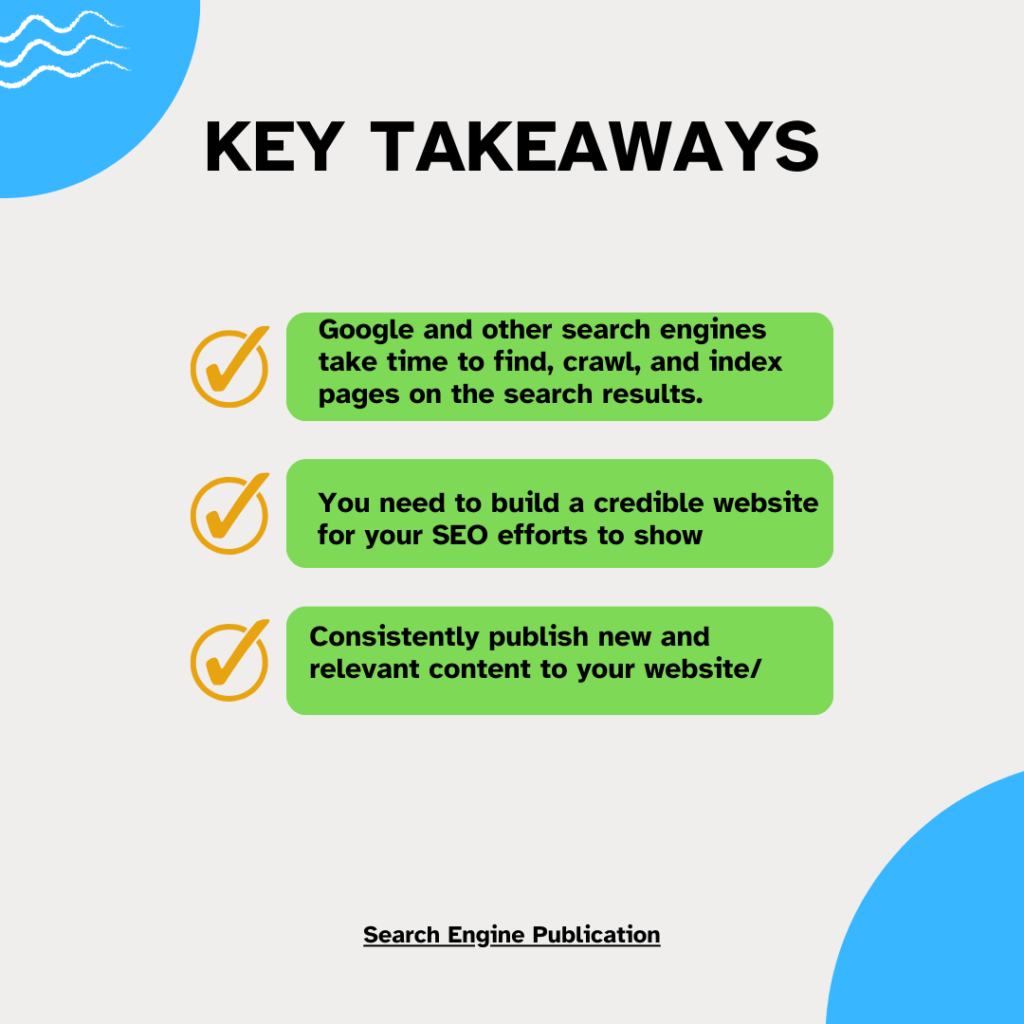Ten-minute delivery, online meetings, and streaming an entire Netflix series in one sitting.
SEO is similar to traditional publishing in a world accustomed to tweets and reels.
But how long does it take for SEO to work?
When it comes to SEO, most of us link it to the first-page ranking.
Sorry to burst the bubble, but ranking on the first page depends upon numerous factors, and search engine optimization is one of them.
But, as a general rule, your ORGANIC SEARCH TRAFFIC should increase if you invest in SEO.
“In most cases, SEO needs four months to a year to help your business first implement improvements and then see potential benefits.”
Maile Ohye
In this article, Search Engine Publication discusses:
- The average time frame to achieve SEO results
- Factors impacting the SEO results
- How do you get better SEO results?
How long does SEO take?
SEO can take between four to 12 months to start showing results. Often, to see consistent results, it might take up to a year. The results from Ahref support this claim:

If you consider SEO as an immediate fix, you need to start from the basics of SEO again! (That’s the harsh truth!)
Any search engine strategy you implement takes time. Had Romulus and Remus (Founders of Rome) built Rome in one day, would it be as exquisite as today?
In short, every good thing takes time to build up; rushing your search engine optimization will do more damage than good.

Why does SEO take so long?
It takes so long to work because Google requires time to find, crawl, and index relevant websites and pages. As you upload content on your website, Google’s search engines work to determine what the content is about and what search intent it successfully answers.
As the entire crawling process is out of your control, Google takes its own time to determine the credibility and trustworthiness of your website and its content.
Another reason why SEO takes so long is it takes time to implement search engine optimization best practices across your website. Only when the Google search console thinks your website is credible will it send traffic to your website.
What factors impact the time to search engine results?
You need to understand that SEO IS NOT advertising; you can’t pay Google thousands of dollars to rank on the search engine result pages (even though you may wish this was true)!
To rank as the snippet or as number one, you need to show Google you’re the best, most relevant, and most helpful result based on the user’s search intent. You need to surpass the existing top-ranking pages for:
- Relevance
- User Experience
- Originality
- Quality
- Expertise
Mastering all of these takes time, which is why SEO takes time to work. Some factors affecting how long SEO takes include:
Your website
Like it or not, your new website will take longer to rank on search engines. Why?
Come on! You’re new even to Google. Google doesn’t know who you are, whether you’re credible or trying to hide your credibility behind a mask. Like everything else, you need to give Google time to know who you are and how useful your website is for customers.
In such a scenario, fluctuating search rankings make complete sense.
In your first year, search engine algorithms try everything possible to crawl and index your website to know where to rank it. As authoritative websites have a proper website structure, are free from technical issues, and use an optimum number of target keywords, they’re much easier to rank.
However, this doesn’t mean your newly launched website cannot rank early on. Feed your website with regular, meaningful, high-quality content to rank higher on search engine result pages and increase organic traffic.
Tip: Content is, was, and will remain the KING for SEO and organic traffic, regardless of what many industry experts claim.
Your competitors
You’re probably not the only person in your industry. You have other players who are nailing their SEO strategies. If the keywords you’re targeting are super competitive, ranking for them might take much longer.
For instance, it would be great to rank for the keyword “search engine optimization”, but the keyword research shows:

With a keyword difficulty of 97, ranking for this keyword may take years and hundreds of backlinks. Ouch….did you get heartbroken?
Instead, you can try ranking for keywords like SEO vs SEA.

You can even try to rank for keywords like: “How long does SEO take to work”

Compared to the first one, the second and the third keywords can easily rank for organic search results. When starting, start with easy or very easy keywords.
Tip: Investing in tools like SEMrush or Ahref not only helps you decide your target keyword but also lends a helping hand in understanding what your competitors are doing.
We’ll cover that in another topic.
Your goals
Before diving deep into the complex world of SEO, know your goals:
- Do you want to rank for low and medium-traffic and easy keywords?
- Do you mean to compete with the top brands and high-traffic keywords?
Choose the first option if you want to build a business that thrives on organic traffic. And, choose the second if you want to spend hundreds of dollars trying to acquire backlinks from hundreds of credible websites.
As a business owner, the choice boils down to you.
Tip: Don’t get carried away by the organic traffic and ranking of the big shots in your industry. A few years ago, they were in the same position as you. They relied on an achievable SEO strategy to increase their organic traffic.
Your resources
Money can buy you almost everything, and your time helps you achieve the unexpected. Confused?
When time and money come together, they form a lethal bomb! A bomb that diffuses to take your SEO efforts to another level.
It’s simply mathematics: the more resources you use, the faster you expect positive SEO results.
By infusing more money on your SEO efforts:
- Implementing changes in SEO will not consume as much time: With more resources, it becomes easier to make necessary changes. You indirectly make your website more compatible with natural language search.
- Investing in top-tier SEO tools becomes easier: SEO tools provide features and insights to enhance your SEO. From data analysis and keyword tracking to backlink analysis and SEO audits, these tools house numerous functionalities.
Still, give priority to quality over quantity.
For instance, when creating content, produce high-quality content that addresses your audience’s pain point and provides value. What’s the point in publishing content for search engines?
Similarly, while building backlinks, have fewer links from reputable websites than dozens of links from spammy websites.
Tip: Invest wisely in technical SEO because it can make or break your SEO campaign.
Your strategy
Your strategy is paramount. Without effective SEO strategies, you experience slow results, and the probability of negative SEO results pops up.
So, don’t be in a rush!
Spend time analyzing your business’s unique needs. Once identified, use SEO best practices to achieve your desired goals.
Tools Moz and SEMrush streamline the optimization process and ensure your SEO efforts are correctly directed.
Tip: Suggestions from these tools improve your site’s online visibility and drive more organic traffic. A well-planned SEO strategy is a difference between a high-ranking and low-ranking website.
How do you get better SEO results?
If you’re a beginner, these three ways help you to get better SEO results faster:
Focus on low-competition keywords
Haven’t we repeated this enough?
Choose low-competition keywords, as they’re much easier to rank for. Look for keywords where a low domain rating (DR) ranks on the first page. It’s much easier to rank for these keywords, especially if you’re a new website.
Fix technical SEO errors
One of the SEO ranking factors is your technical search engine optimization. Certain serious technical optimization errors make it challenging to rank. For instance, if Google cannot index your pages, your web pages will never show in the top results.
Remove unhelpful content
Website owners should know that unhelpful content unrelated to search queries will decrease the authority and credibility of your website. As a result, you may not show in the organic search results. To understand which content is ranking on search engine results pages, do the following:
- Remove: When your content is not performing well in key metrics and has limited potential for improvement, delete it.
- Redirect: If numerous pages on your website discuss the same topic, redirect them to a single resource. Once this consolidation is complete, set up redirects from the original pages to the new page.
- Improve: If a page can attract substantial traffic and lead to conversions, invest your time and effort into enhancing its quality.
The strategy you follow – removing, redirecting, or improving content – depends on the content’s potential to drive traffic and conversions and its current performance.
Consistent and ongoing SEO success is the best.
Search engine optimization is a continuous process, not a one-time affair. Patience and consistency are two virtues that help you master SEO. Apart from regularly monitoring and implementing SEO strategies, understand your user’s intent. The initial results you see are just the beginning of your optimization efforts.
With a well-structured SEO strategy, you see improved results as time progresses. As you optimize your content and build high-quality backlinks, your website’s visibility in search engine results will likely increase.
This drives more organic traffic to your site and potentially leads to higher conversions and sales.
How long does your SEO take to work? Share your experience with Search Engine Publication!
Image from freepik


Very insightful article. Loved reading it.